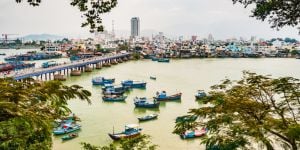Registering a business in Vietnam
Subscribe to the topic
Post new topic
Hello all,
Does anybody know what the pros and cons are of registering a business in the city, and what it entails (costs, procedures, conditions, etc)?
Also, do I have to register a business if it has to do with tourism?
Lastly, am I even allowed to own a business here, as a foreigner (Viet Kieu), and what I can do to have that ability?
Thank you so much,
Sofia
Sofia,
Being a foreigner in this land, your mere presence must be registered, let alone your business.
You can push your lucks by operating without the proper registration; but I highly recommend that you don't. You have a lot more to loose out here than others.
Your questions above are just too general. To completely answer those questions, it will take a few chapters on living and doing business in Vietnam.
Let me give you these: weight the costs against the benefits of the different types of business ownerships here. Then, learn about all the options that are available to you. Maybe even see if you can create more options for yourself. Then, go from there.
Without even reading your personal profile, your questions tell me that you are either very young or are quite green when it come to business and Vietnam. Take you time, Sofia, mistakes here cost much more than they do back in North America.
Last but not least, like I had mentioned in your other post, you are not even a Viet Kieu. Well, if you do something wrong or if the Vietnamese government wants something from you, then they might consider one. But, when it comes to your personal rights and professional benefits, you are a Canadian.
Warm regards,
Howie
Yes, you will have all to register, you even need a work permit to work/own your own business.
Travel agent - as a foreigner, you are even restricted in that sector (other restrictions/limitations/obligations: coffe, alcohol, foods, military, import/export, medical.) insurances.....
Depending on location, where you are, additional restrictions might apply.
Some businesses will.might not registered in some areas. To settle there, you will have to start at a different location/province/region and later later move your business to the desired location.
As a matter of fact, it is quite complex and will take at least 12 weeks +, for a foreigner, assuming, you get all permits/paper works on the first shot right.
If you by chance in the NT area, you can contact me via pm , to sort out some details.
Sofia
As mentioned in the other thread, I would advise you to contact this agency
http://kieubaoviet.vn/
They are the experts in this area.
Unsurprisingly, TP HCM is the most welcoming city for business.
But that welcome involves 'red tape', form filling, tax and labour obligations - which is why so many VN businesses simply pay cash. The bite comes when they grow old and there is no pension and the old man dies earlier than the wife.
TP HCM also wants to know when you are in business in the city, you aim to stay here and have an office, etc.
But all provinces welcome business and they all have offices established to assist entrepreneurs.
One or two things: Never hold money in bank accounts in this country, only what you need. Also, never give access to your money to anyone, period. Do/get everything in writing and stire them carefully.
The law in VietNam is immature, they are slowly building their case law against which to use for new cases.
If you want to get involved in tourism you will have to check with VNAT - they are quite smart now. Recently some Foreigners started a guiding service for Foreigners - for money - but they were closed down. No Bond posted; no guide licences; etc.
As in any endeavour, working in a company in your chosen field to learn the ropes before breaking out on your own helps.
Check out:
Government Help Website < www.business.gov.vn/index.aspx >
Trade - Ho Chi Minh City < www.trade.hochiminhcity.gov.vn/index.jsp?lang=en >
Remember: Most all business transactions are cash (or transfer) up front. Only VNPT will extend credit (for a month) and EVNwill require a deposit.
as I mentioned in the other thread, http://kieubaoviet.vn/ is an official government office guiding VietKieus. Being a VietKieu (one that has been qualified by the government) gives you more privileges than just being a foreigner when it comes to investment, starting a business and buying property and this office knows the difference.
Just read the website may also give you some ideas.
Jaitch wrote:Remember: Most all business transactions are cash (or transfer) up front. Only VNPT will extend credit (for a month) and EVNwill require a deposit.
While it may be true for some B2C (Business to consumer) or in SME (Small Medium Enterprise) business to have to pay upfront, paying in arrear is normal in B2B.
In fact, it is misuse as a legit financing source. I see it everyday: businesses purposely delaying paying their vendors. Six months' delay is nothing unusual.
There is a famous case ongoing right now with a businesswoman owing her vendors (fish farmers no less) 13 million USD (and the banks untold millions)
(google Bianfishco if you want more)
Hi gang,
Since Sophia is not too specific with her questions. Let me ask all of you this: how are you registering your businesses, how much did that cost you, and how long did it all take?
I came here in '09, wanted to start a 100% foreign-owned company in HCMC. A law firm wanted $7000 USDs in fees and informed me that the process was going to take 6 months.
I went to Can Tho, found a Vietnamese that I could trust, asked him to start a Vietnamese-owned company with me (a documented Viet Kieu) as its majority shareholder. The entire registration process cost me about $200 USDs and took 1 week. No question was asked about the source of my investment.
Now, I(a full-fledged Vietnamese)am looking to start a new company with a Vietnamese friend and a Singaporean friend. The same place that granted my other company its charters, once learned that my Singaporean friend was not of Vietnamese descent, is giving me the run-arounds. Most of the people in that office avoid me. Among the ones that showed up, the common theme has been, "Don't put your foreign friend on there. Just work out some mutual agreements with him on the side because his, official involvement will create tons of paperworks and drag out the processing time." A few were a little more specific and told me that "the source and the amount of his investment must be verified and approved by higher authorities". I was also told that was how many foreigners set up and operate their ventures here, in the Mekong Delta.
In the first case, does the amount of money and processing time sound about right to you, ballpark figures?
In the second one, the people I had working for me didn't cut corners, did they? Do Viet Kieu really have such leeways here?
Last, is Vietnam still that critical of foreigners? How long would the "higher authorities" take to approve such ventures? How do some of you set up your operations, where you are at?
Thanks guys,
Howie
Howie
I am just a lowly employee in a Vietnamese company, so I would not be able to help you with the specifics. Besides, I am not a lawyer and your questions are so complex that even a lawyer would hesitate to answer.
How much and how long? All depending on how detailed, professional or complex the company is. I know a legal firm based here in HCMC asking $10 000+ just for a quick and dirty review of a JVs charter.
For a foreigner to set up shops here requires much more paperwork. The latest regulation about this matter is 43/2010/NĐ-CP (business registration law), 108/2006/NĐ-CP (guidelines about investment law), investment law 59/2005/QH11 dated 29/ Nov/2005.
The last two laws require the first time foreign investor (that also includes VKs) to have a written investment plan as well as filling various forms before they can be granted an investment license which is required for foreigners to invest/start company here.
The Ho Chi Minh City Peoples Committee can approve investment licenses or investments in Ho Chi Minh City that have a capital value under US$10 million and are not in restrictive areas of investment. Officially, they say it should take less than 45 days.
A number of foreigners think they find a loophole by buying shares of EXISTING Vietnamese companies instead of starting a new one. They think it does not require them to obtain first the investment license as the case when they start a new company, a joint venture,... They are wrong.
They may not see a difference if everything goes smoothly, but if they run into problems, their legal rights are reduced at best.
In addition, tax declaration and registration for foreigners are also a problem.
Hope it answers some of your questions.
You have to bear in mind there are super-cities and there are regular cities with provincial status. Can Tho and Hai Phong are the latter.
Super-cities, Ha Noi, Da Nang and HCM, are believed to have enough 'smarts' to be allowed flexibility, this applies to many areas of government including immigration, business investment, etc.
If possible avoid lawyers as your promotional tool. The fees they want simply illustrate they think you are stupid.
My business was formed in TP HCM about 14 years ago. I had a secret weapon called wife. It was her determination in battling the then red tape that made things easy.
After registration, and having an office - visited frequently by green suits, we set about migrating to another province. Since we had a business authorised by TP HCM the process was made easier.
These days most every province has a business development office. They are (most times) very helpful in making things go smoothly. They love labour intensive operations.
The first wave of investors were from TaiWan and Korea with a smattering from China. However, a few, quite a few, left bad tastes in mouths when the left after times got hard, abandoning plants and unpaid workers.
I have heard from government officials they prefer Caucasian investors as they are more honest with workers and government. They don't play tricks.
Who else pays their bills on time? Who else gives benefits above the legal requirement?
Any way, we started an office in DakLak and officially transferred our operations, after 3 years, there. TP HCM called us in and expressed regret and we gave acceptable reasons. There interest was to see if things could be modified, not only for us, but others, too.
Personally, I like the HCM government attitude to it's duties. This shows in so many areas of the city life.
After moving to DakLak we expanded and their commerce office was always there to help. They had our utilities improved (fibre optic to the office, upgraded electrical capacity, etc).
We have always had a policy of paying fast. This keeps government auditors away, and generates more goodwill. We do not pay bribes - we have a notice in our reception that says no bribes paid unless authorised in writing by the senior director!
So my advice is use government facilities, start in a super-city (although Ha Noi should be the last choice).
Foreigners attract attention because they have to get Residence/Work Permits AND the government makes sure they pay their taxes, etc. VN can get away with murder by paying cash, breaking the Labour Code, etc.
I cheat, a little, by paying my employees more than I declare, but we still pay all the medical/social contributions we are supposed to. We honour the maximum hours per week, all vacations (paid time in lieu if they have to work), etc.
Our branch office is unregistered but it is only so we can do business here with TP HCM suppliers.
We employ three women, now, at home-based businesses (PCB assembly) here in TP HCM but the still get full benefits.
Overall, except for the Res/Work Permits I would say doing business in VN is only incrementally more difficult that in Canada or the UK.
I laughed when I read Anetta's comment: "In addition, tax declaration and registration for foreigners are also a problem." Translated, this means the government expects you to pay taxes!
And don't insult government employee's intelligence, they know all the tricks and they learnt from the best - the VN owner businesses.
VN subscribes to many tax-offsetting agreements that avoid double dipping by governments.
The biggest bug-a-boo is money. The banks are the worst at looking after your interests and this, coupled with the State Bank of VietNam changing policies, can make for hardships.
Our business has four customers. These are associate companies in the US, Canada, the UK and Europe who act as agents and collect money in their respect currencies, in banks in their countries. This way we can hold our money in stable financial environments and draw on them as required.
We have a tax department employee who moonlights doing foreigners books and a VN bank who handles payroll and accounts payable settlements. (NOT bureaucratic VietComBank!)
Wild1, to your Singapore friend, who I believe whose identity I know, I would say you have zero legal protection if things go wrong he has few protections.
And, again, doing it in TP HCM is easier than Can Tho.
Hello all!!! Looks like it's the same group as my previous post!
Hehe.... Well Howie, you deduced right... I am new at business and relatively young...
Oh in relation to the other post, I just wanted to say that I do have a work permit here (valid for one year) which I obtained from the school that I work at.
As for all of this information about starting a business, I'm not gonna lie, it is all very complex to me and beyond me... But my boyfriend will be reading all of this soon, as he is the business end of our business.
I will definitely read up on the Kieu Bao Viet website you indicated and I will consider all of the advice given.
Thank you so much once again for taking the time to share your insights and tips.
Thank you,
Sofia
Anatta wrote:laws require the first time foreign investor (that also includes VKs) to have a written investment plan as well as filling various forms before they can be granted an investment license which is required for foreigners to invest/start company here.
I heard about this. But, how was my guys able to go around that with my other company, formed 2 years ago when I was a Viet Kieu? I provided no business plan; nobody asked me anything about my money? We are working fine...
Hey, a loophole, huh...
jaitch wrote:I would say you have zero legal protection if things go wrong he has few protections.
Yes, he did mentioned you to me before. But, what do you mean? Together we have 3 different passports. Which ever way, one of us must be protected, no???
Sofia wrote:As for all of this information about starting a business, I'm not gonna lie, it is all very complex to me and beyond me... But my boyfriend will be reading all of this soon, as he is the business end of our business.
You should have let him ask the questions. I was wondering about you... An English teacher doing business in Vietnam? 
Articles to help you in your expat project in Vietnam
 Working in Vietnam
Working in VietnamAnyone thinking about working in Vietnam is in for a treat. Compared to many Western countries, Vietnam's ...
 Setting up a business in Vietnam
Setting up a business in VietnamForeign entrepreneurs from across the globe have been landing across Asia for decades. In August, Harvard ranked ...
 Finding a job in Hanoi
Finding a job in HanoiWith Vietnam's new visa regulations, you will need to secure a job before entering the country. Opportunities to ...
 Working in Hanoi
Working in HanoiThe traditional capital of Vietnam is quickly becoming a professional's paradise. Attracting over 20,000 ...
 Internships in Vietnam
Internships in VietnamInterning can be a wonderful eye-opening way to experience a new country, culture, and work climate in your ...
 Working in Vietnam as a digital nomad
Working in Vietnam as a digital nomadVietnam is emerging as a new popular destination for digital nomads and downshifters. As the prices in most Asian ...
 The Vietnamese labor market
The Vietnamese labor marketDepending on your industry and patience, finding a job in Vietnam can be a challenge. Many companies and local ...
 Working in Nha Trang
Working in Nha TrangThe city of Nha Trang, located in the province of Khanh Hoa, thrives on tourism. If you are looking for a job in ...
Find more topics on the Vietnam forum



